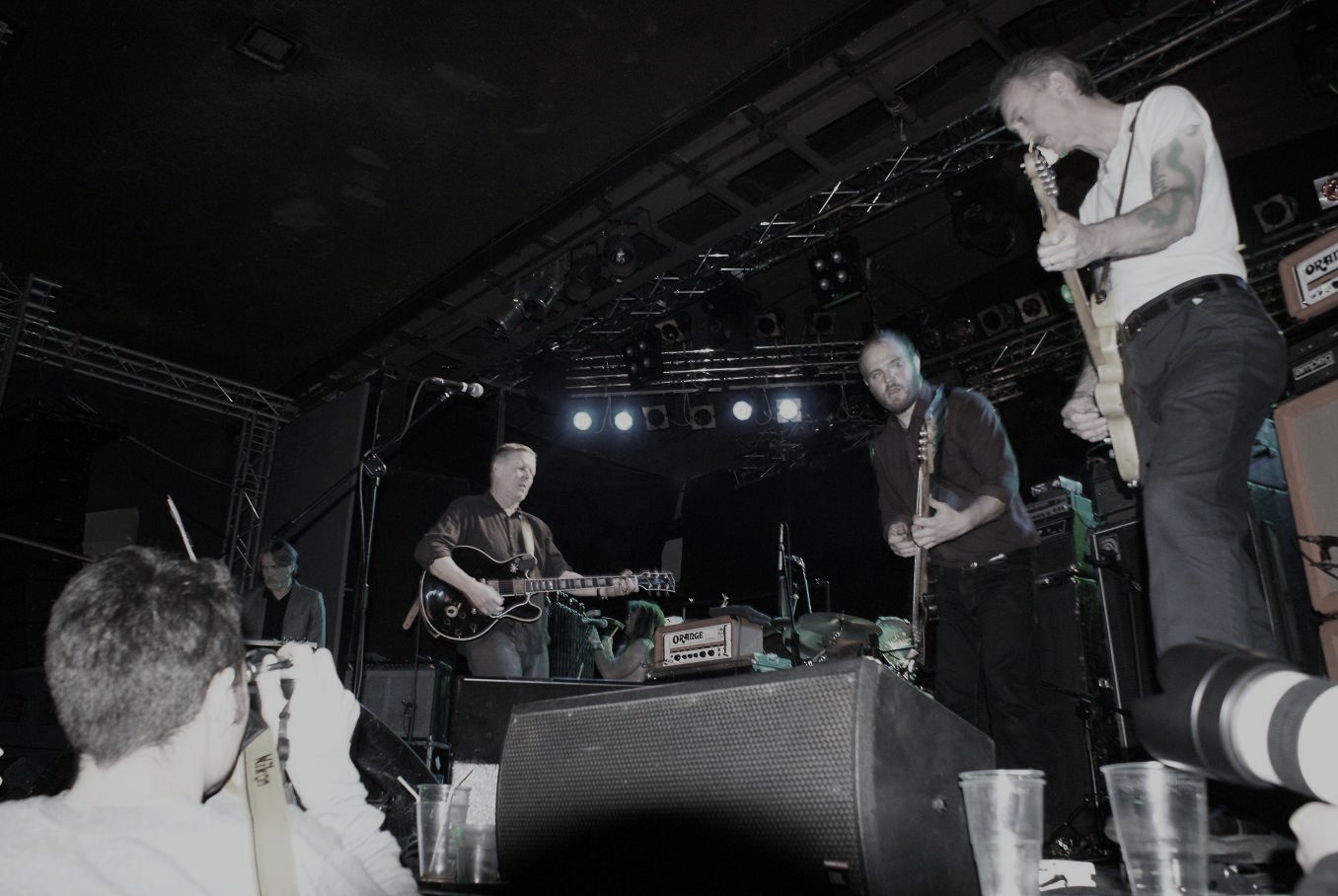By Kodie Cherrille (The Cascade) – Email
Print Edition: September 10, 2014

I’d never been to the Venue before. It seemed like an odd place, in paper, for Swans to play. I thought they’d surely play at a “seedier” place than a nightclub on Granville (I don’t mean that as derogatory; seedy venues are brilliant in their own right). The dark atmosphere inside, however, suited the sounds to come.
“This place makes me think of The Social Network,” my friend says. I’ll leave you to interpret that — I’ve never seen the movie.
I pointed out the clutter on stage: amps, a guitar, drums, and a singing saw. Behind all that is the pile of gear for Swans (towering above everything else is a gong, and next to it some dulcimers). A man and a woman take their places: the woman on stage right, looking serene as she watches the man on the left begin the procession, working over a tiny synthesizer.
Over a sawtooth synth drone, Carla Bozulich comes onstage. Her black dress is torn, her hair a tangle of darkened, wild curls. She surveys the audience, fixes a gaze on some spectator, and beats her hand to her chest three times. She looks somewhere else, beats her hand again. She takes her spot on the cluttered stage and picks up her guitar, and with some handheld magnetic tool, makes it roar with feedback.
The songs that follow are various exercises with this squall of noise: the synth player loops a sample that grows more and more distorted, and with a free hand whales on a drum; the woman alternates between drum and saw duties. Carla croons, whispers, and screams with a range that harkens Jarboe (once a principal songwriter for Swans), leaping and falling to her knees, sufficiently quarantining her energies within the tiny spot of stage she had to work with. There are no riffs — the songs are expansive, but not quite ambient outings — and I imagine these pieces as blues songs for a dilapidating city, with abandoned buildings swaying dangerously in static storms.
And then, the beautiful, vicious Swans: the clutter clears, and there’s a huge, bearded man banging a gong. It summons the band — all sharply dressed and looking very stern — to their instruments, all playing the same note for at least 10 minutes, getting ever louder. Finally, the music dies down; Michael Gira steps up to the microphone, hums out something indiscernible, and then the band roars back into action. This is a new number, and even though To be Kind was released only a few months ago, Swans have come with a heap of new material; nearly half of the set was either new or unreleased music.
Live Swans consists of a surprising amount of spontaneous energy. Gira is the main conduit, but through a language of head-nods and melodic tics, the band communicates just precisely where in the song they are. At other times, Gira dances with an Ian Curtis-like abandon, though he never forgets to conduct his bandmates with a raising or lowering of his arms.
“A Little God in My Hands” live is an inversion of the studio outing. The lurching riff is quicker and more jagged onstage, and yet what made me jump in surprise on the album feels like a natural culmination on stage. Gira lifts his hand from his guitar, raises it: the whole band gives everything. My entire body is vibrating, and I feel like the ground I am standing on is not level anymore. “The universal mind” of the song is surely attained at high volume.
My night was made with “The Apostate.” Those hair-raising, distant howls in the beginning? A motherfucking electric lap-steel. Drummer Phil Puleo and percussionist Thor Harris extend the best part of the song — the perfectly timed drumming, picking up speed here and imperceptibly decelerating there (a collapse of something huge is signified) — and when the post-apocalyptic dance groove sets in (Thor picking up a hammer and banging those dulcimers attentively), Gira gives it all he’s got: blood-curdling screams, leaping, dancing. It is inspirational to see this 60-year-old man rule the stage and command such a visceral sound.
At the end of the show, the six of them line up onto the front of the stage and bow. Gira says that he and the band will be outside and at the merchandise table, talking with whoever might come by. It was fantastic to see them outside, making small talk with anyone over cigarettes — to see a band hell-bent on their art, yet still taking the time to be kind.
